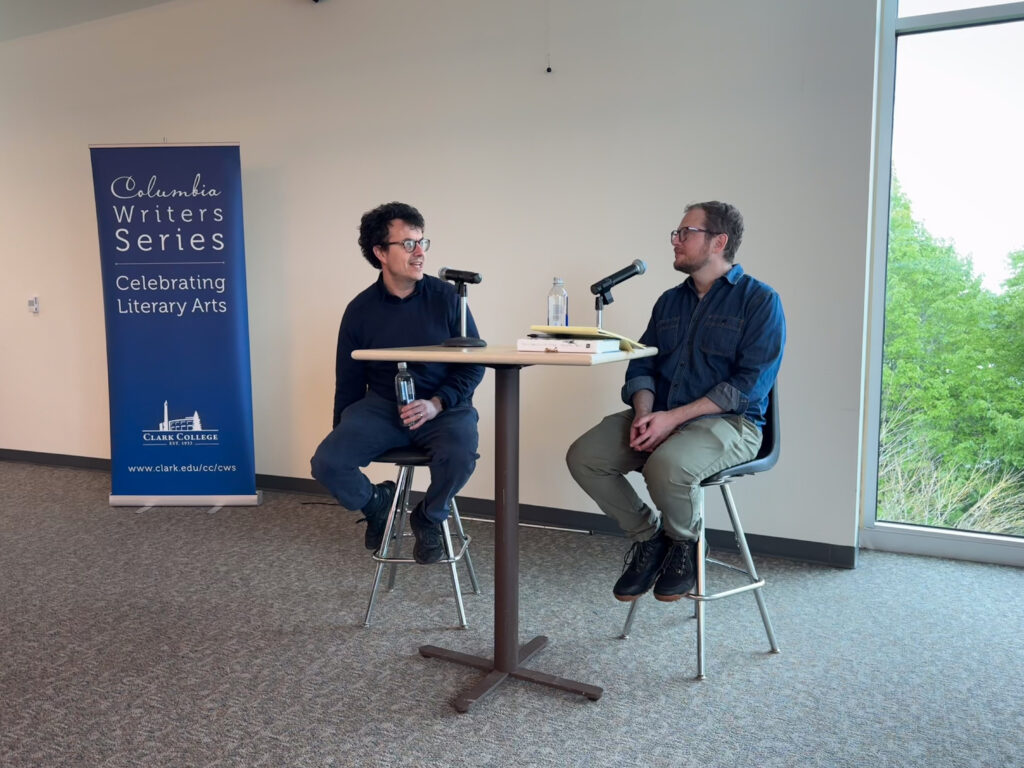“Alt Text Is Poetry” — Andrew Leland on Writing and Disability Justice

Andrew Leland quoted Georgina Kleege’s Sight Unseen to explain his own relationship to his work: “Writing this book made me blind.”
Authors Andrew Leland and Justin Taylor discussed Leland’s new memoir, The Country of the Blind, at the Spring Columbia Writers’ event. It was attended by Clark creative writing students, students from the nearby Washington State School for the Blind, and staff from Cannell Library and Disability Support Services (DSS).
Leland’s book shares his experience of slowly losing his sight due to a degenerative eye disease, Retinitis Pigmentos (RP). More than a description of his life, his memoir explores history, disability justice, and what it means to identify as blind.
With emotion, Leland said a blind reader described his memoir as “the story of our people.” Leland added, “it’s incredibly moving for me that it might have value.”
Writing the book helped Leland process his recently accepted identity as a blind person. At the beginning of his journey, “blindness did not feel like a word connected to me.” As he wrote, he evolved from using third person to describe the blind community (they) to using the first-person plural (we).
The book covers some of the history of innovation driven by blind people. The first typewriters, audiobooks, and LP records were adaptations designed for blind accessibility. Adaptations can become their own form of art as blind people experiment with how to communicate information within the world’s inaccessible design. As Leland put it, “Alt text is poetry.”
An early form of Optical Character Recognition was the Kurzweil Reading Machine, which scanned print books and turned them into computer-spoken words. The inventor designed it for blind people, working closely with the National Federation of the Blind.
When Xerox purchased the machine, the company laid off the blind sales staff. The technology then became a foundation for the internet, which today remains largely inaccessible to the blind. Only 2% of home pages are fully accessible to screen readers.
Leland said, “Often, after it [the technology designed for accessibility] gets coopted into the mainstream, the accessibility falls away.”
According to Leland, information access is one of the biggest barriers affecting blind people. The disability justice movement seeks to change barriers to access for blind people and for all those experiencing disabilities — including multiple disabilities. Key to the movement is understanding how experiences of disability intersect with other identities such as race, class, and gender.
He shared his own experience of diving into disability justice, and how his views started out as naive but became more complex as he talked with more people. “My privilege is intact and will continue to be intact as a blind person… to be a blind person of color is a radically different experience.”
He advised college students to be unafraid to engage with the disability justice movement even if their knowledge is incomplete. “It’s an important first step to be like, ‘I think it’s like this’ and then you take the tires off.”
Leland also shared his advice on writing. He advocates for a regular writing practice — even if you’re not writing with a goal of being published — to prepare you to write when you have something important to say.
“The butt-in-chair principle I think is really important,” Leland said and added “don’t be a hermit… it’s important to be sharing your work with readers.”
Find books by Andrew Leland and Justin Taylor at Clark’s Cannell Library or local independent bookstores.
About Andrew Leland
Andrew Leland’s debut book, The Country of the Blind: A Memoir at the End of Sight, about the world of blindness (and figuring out his place in it), was published in July 2023 by Penguin Press. His writing has appeared in The New York Times Magazine, The New Yorker, McSweeney’s Quarterly, and The San Francisco Chronicle, among other outlets. From 2013-2019, he hosted and produced The Organist, an arts and culture podcast, for KCRW; he has also produced pieces for Radiolab and 99 Percent Invisible. He has been an editor at The Believer since 2003. He lives in western Massachusetts with his wife and son.
About Justin Taylor
Justin Taylor is the author of the novel Reboot, the memoir Riding with the Ghost, the novel The Gospel of Anarchy, and two collections of short fiction: Everything Here Is the Best Thing Ever and Flings. His work has appeared in The New Yorker, Harper’s, Bomb, and Bookforum, among other publications. He has taught writing at the graduate and undergraduate levels in programs all over the country, including Columbia University, N.Y.U., the University of Southern Mississippi, and the University of Montana. He is a contributing writer to the Washington Post’s Book World and the Director of the Sewanee School of Letters. He lives in Portland, Oregon.
About the Columbia Writers Series
The Columbia Writers Series has been a part of Clark College since 1988, bringing local, national and international authors to the college throughout the year. Writers who have visited Clark College through the series include Ursula Le Guin, Donald Justice, Sherman Alexie, Marvin Bell, William Stafford, Jamaica Kincaid, Gerald Stern, Carolyn Forchè, Natalie Diaz, Karen Russell, Jess Walter, Dana Spiotta, Mitchell Jackson, and many others.
Next up: Learn more about the Creative Writing Festival
Photo: Clark College/Carly Rae Zent












